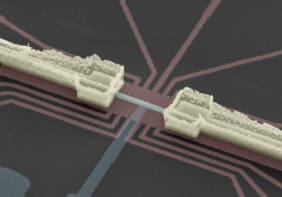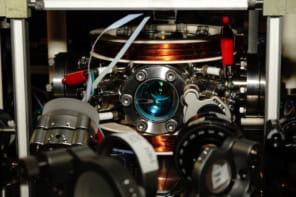Chanda Prescod-Weinstein reviews Helgoland by Carlo Rovelli

Carlo Rovelli’s new book Helgoland is, ostensibly, a journey into quantum physics. The story is told linearly, beginning with a small group of men whose work cemented its most foundational ideas, and ending with a meditation on how quantum mechanics provides insight into human neuroscience. It is a slim volume, coming in at under 170 pages. For this reason, one might imagine that it doesn’t contribute much to the already extensive literature for general audiences on quantum mechanics, which includes the recent book Einstein’s Unfinished Revolution: the Search for What Lies Beyond the Quantum, by Rovelli’s good friend (and my PhD co-adviser) Lee Smolin.
But Rovelli isn’t just giving a history lesson or background. He arrives with an agenda, and one that is tied to the reasons why quantum theory continues to capture the public’s attention. Ideas like wave–particle duality intrigue the general public, because they are so wildly unintuitive, while the best physicists in the world are still unsure of how to interpret their meaning.
Here, Rovelli’s Helgoland takes a specific position, introducing the reader to the “relational interpretation”. In short, the relational interpretation insists that the quantum state of a system depends on the observer, and it is a concept that Rovelli has helped to formalize and convert into an area of active research. It is only natural, therefore, that he will want to advertise it. Certainly, the reader gains insight into the ideas that influence Rovelli’s thinking. There is a longer-than-expected discussion of the ideas of Vladimir Lenin as well as Aleksandr Bogdanov. Given that both were thinkers who heavily influenced the Communist Revolution in Russia, it was surprising to see them brought into a text on quantum mechanics.
Elsewhere, he discusses the philosophies of second-century Mahāyāna Buddhist scholar Nāgārjuna, suggesting that ideas from outside of Europe have something to offer as we try to understand this fantastical theory of the subatomic world. Probably more than most readers, I am sympathetic to the entangling of physics and philosophy, and I was intrigued by this. Even so, in the end it felt more like an aside than a real attempt to decentre European analytic frames.
In fact, Rovelli’s book ultimately operates as yet another book about Great (White) Men. This is not to say that it is poorly written. Importantly, one of the blurbs on Helgoland says, “Physics has found its poet.” Indeed, Rovelli can write a sentence. This might seem like a pedantic comment, but the sentence is the most important part of prose, and good prose is composed of good sentences. Though I read the book in translation, the successful handiwork of Erica Segre and Simon Carnell, Rovelli’s voice – as I recall it from hearing him talk at conferences I attended during graduate school – comes through. It is passionate, excited and charismatic – much as I remember him.
Even so, the absence of women as real, complete human beings in the story is highly noticeable. This is not because I expected Rovelli to go out of his way to include the research of women who have made contributions to quantum physics. Intuitively, I knew not to expect this. What I did not see coming was that, in the act of setting the scene, Rovelli would do things like casually mention that Schrödinger “made no secret of his fascination with pre-adolescent girls” (p21). This particular passage goes on to detail the impact that Schrödinger’s sex life had on his academic positions.
While I believe in the value of sharing the whole picture of who someone was, rather than valourizing dead scientists as perfect heroes, nothing in Rovelli’s text problematizes Schrödinger’s behaviour. Instead, it is mentioned almost as a curious aside. Schrödinger still gets to be great in the end, with an equation named after him that every university physics student in the world learns.
Building a quantum-powered future
Elsewhere, Rovelli describes how a poem cannot help him survive, though “a young woman might fall in love with my romantic soul” (p146). Over and over again, rather than being ignored, women are invoked in the text as objects and/or attendants to the journey of a Very Important Man. There’s a kind of old-school masculinity embedded in the narrative as well, for example through the glorification of Bogdanov’s death due to a blood exchange experiment. “Right up until the end, he had the courage to experiment, the courage to exchange and share, and the dream – and practice – of brotherhood” (p115). It feels like a political statement in 2021 to write a book that is about a theory of the whole universe and then gender it so intensely.
For those who like to understand how Rovelli thinks about the physical theories that he has devoted his life to developing, Helgoland will be an interesting addition. There’s a way in which it can feel like it meanders and/or is throwing lots of things at the wall to see what sticks. But that’s alright – that, for many of us, is the practice of theoretical physics.
- 2021 Allen Lane 208pp £20hb




